Cochrane Infectious Diseases Group
 Since 1994, the Cochrane Infectious Diseases Group (CIDG) has been preparing systematic reviews on the benefits and harms of healthcare interventions for infectious diseases, particularly malaria, tuberculosis, diarrhoea and tropical diseases. The editorial base is located at the Liverpool School of Tropical Medicine in Liverpool, UK and is led by Professor Paul Garner. Over 600 authors from some 52 countries contribute to the preparation of the Cochrane Reviews. They are supported by an international team of Editors, each with topic or methodological expertise.
Since 1994, the Cochrane Infectious Diseases Group (CIDG) has been preparing systematic reviews on the benefits and harms of healthcare interventions for infectious diseases, particularly malaria, tuberculosis, diarrhoea and tropical diseases. The editorial base is located at the Liverpool School of Tropical Medicine in Liverpool, UK and is led by Professor Paul Garner. Over 600 authors from some 52 countries contribute to the preparation of the Cochrane Reviews. They are supported by an international team of Editors, each with topic or methodological expertise.
Over the years the CIDG’s name has changed to reflect the expansion of its scope: Parasitic Diseases Group (1994 to 1995); Tropical Diseases Group (1996 to 1997); and Infectious Diseases Group (1997 to present). The CIDG, which is supported by the UK Department for International Development through the Effective Health Care Research Consortium (EHCRC), aims to ensure that healthcare diseases and healthcare delivery related to low- and middle-income countries are included in the brief of Cochrane and that people from these countries are involved in preparing Cochrane Reviews.
The CIDG’s main areas of work are the effects of interventions for the prevention or treatment infectious diseases of relevance to the United Nations Sustainable Development Goals, in particular malaria, tuberculosis, HIV/AIDS, and neglected tropical diseases. We therefore welcome healthcare professionals and consumers with an interest in healthcare delivery in low- and middle-income countries, who have an interest in preparing a Cochrane Review.
The aims of the CIDG are to impact on policy and research in tropical diseases through the production of high quality, relevant systematic reviews, and to lead developments in review quality improvement and effective dissemination of findings. Our plans for achieving this are set out in our Strategic Plan.
